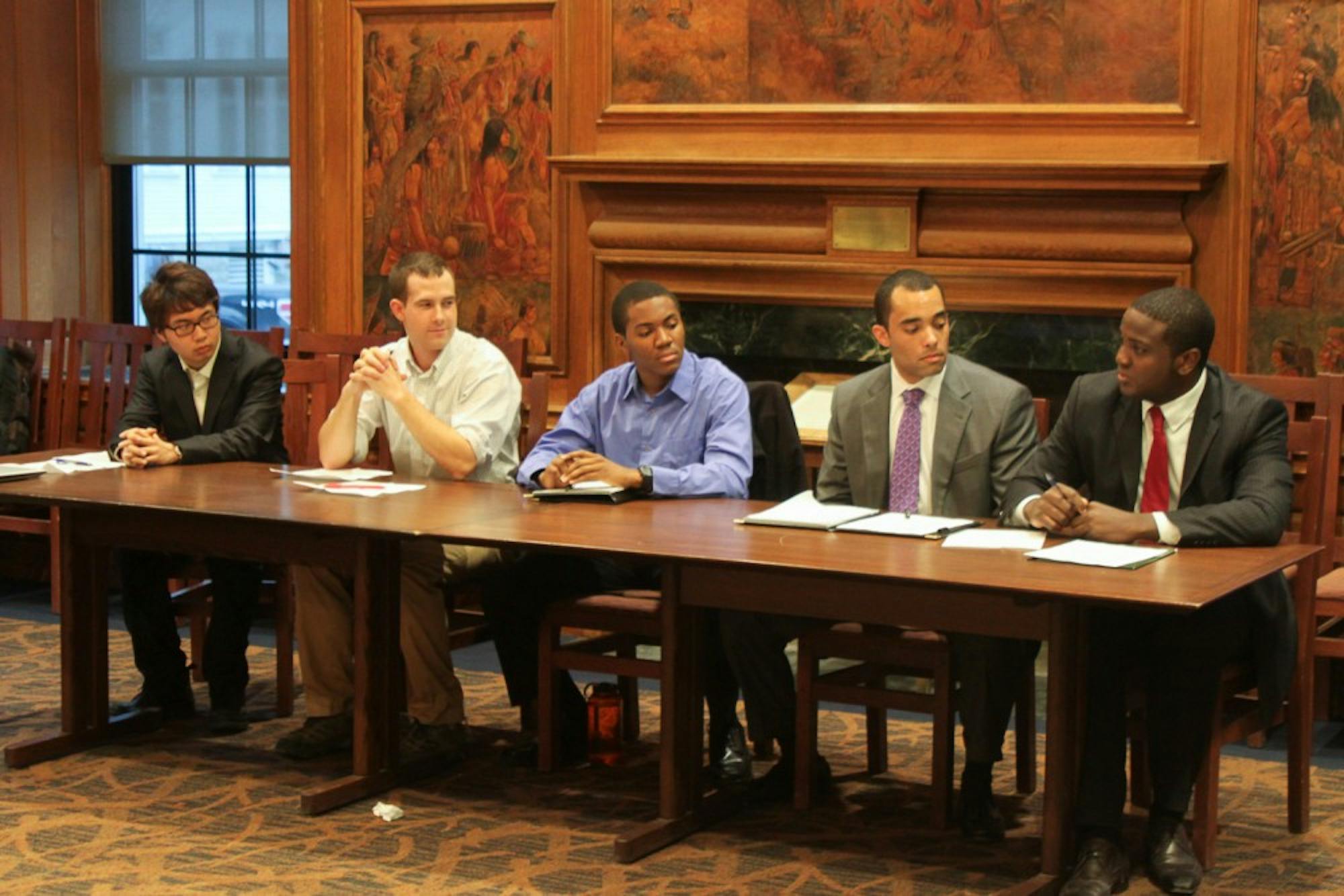In a debate Tuesday night, Student Assembly presidential and vice presidential candidates discussed the Assembly’s role and achievements on campus, sexual assault, the new residential housing system and the “Freedom Budget.” The debate, held in Paganucci Lounge and hosted by The Dartmouth, is the first of several that will occur this week.
Presidential candidates Casey Dennis ’15, Jon Miller ’15 and Yesuto Shaw ’15 and vice presidential candidates Frank Cunningham ’16 and Harry Qi ’17 took part in the debate. For the first time this year, at the request of the candidates, both presidential and vice presidential candidates can participate in all debates, Elections Planning and Advisory Committee chair Ryan Tibble ’14 said.
During the debate, each pair of running mates could respond to questions posed by the moderator, The Dartmouth’s executive editor Michael Riordan ’15. They could also take part in an optional rebuttal period. After the planned questions ended, there was enough time for one audience member to ask the candidates a question.
Running mates Miller and Qi said they would focus on initiatives that affect the student body on a daily basis such as improving Dartmouth Dining Services and Green Print.
Miller said his first step as student body president would be to send out an extensive, campus-wide survey, adding that he would aim to bolster the sense of community at Dartmouth by encouraging students to attend more sporting events.
Qi noted that his past work in the Assembly, such as publicizing course reviews, as why he is a strong candidate.
Shaw said he would make a good president due to his three years of Assembly involvement and his “experience and approachable personality.” As president, he said, his priority would be to increase the Assembly’s relevance to students, which he would do by sending out termly blitzes outlining its actions and accomplishments.
Dennis and Cunningham emphasized uniting the community, and Dennis noted that he would focus on creating environments where students respect and listen to one another.
Candidates generally agreed on the role of the Assembly as a liaison between students and the administration. They also agreed that the planned residential housing system will help foster a sense of community among upperclassmen.
Dennis and Miller disagreed about whether all freshmen should be required to go through the Dartmouth Bystander Initiative program during Orientation week.
Although he supports the bystander initiative, Miller said he believes the Assembly should not require freshmen to undergo training, saying it is more effective when students choose to participate.
Cunningham, speaking for both himself and Dennis, said he believes mandatory training will help unite the community and integrate the program’s lessons into campus culture.
Candidates also presented opposing ideas on Assembly priorities.
Dennis said he believes that focusing on small issues like Green Print are not the most effective way to improve the school or increase application rates, nothing that he will address everyday issues during his presidency but will focus on the larger goal of uniting the Dartmouth student body. Shaw said the president should focus on smaller aspects of student life that the Assembly can change. Miller said he would focus on concrete goals that can be accomplished within the Assembly’s scope.
Riordan also asked how candidates would have responded to the recent sit-in in College President Phil Hanlon’s office.
Dennis said he would have encouraged students to express their feelings and views.
Qi, speaking for Miller and himself, said he would have responded in two ways: holding an open conversation and surveying campus to gauge student opinion.
Although he believed the message of the sit-in was important, Miller said it could have been delivered differently.
Shaw said he believes that it is important to be sensitive to the feelings and beliefs of all students, and said he would have tried to meet with the leaders of the protest.
Presidential candidate Jay Graham ’15 and his vice presidential running mate Matthew Robinson ’15 could not attend Tuesday’s debate.
Graham, a member of the baseball team, was in Boston for a game last night. Robinson was unable to make the debate due to a job interview and an Inter-Fraternity Council meeting. Both candidates will attend all other debates, Graham said.
Miller is a member of The Dartmouth opinion staff.Cunningham is a member of The Dartmouth business staff.
About 35 students initially attended the debate, and around 20 remained until the end.
Student Assembly will host a debate today and the Inter-Community Council will host a debate Thursday. The EPAC plans to organize a debate hosted by the Greek Leadership Council, but as of press time the date had not been released.
Campaigning began Tuesday at midnight, and voting will occur Monday, April 14.
The article has been revised to reflect the following correction:
Correction appended: April 10, 2014
The original version of this story misreported the time of the Inter-Community Council debate, which will take place Thursday.




